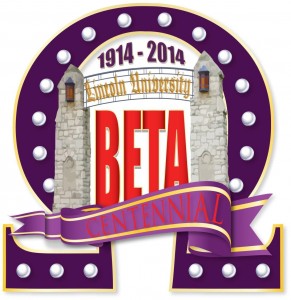- Posted in All University
- Category: Campus News
Four-day February celebration at Lincoln and in Philadelphia
 LINCOLN UNIVERSITY, PA – The Lincoln University’s Beta Chapter of the Omega Psi Phi Fraternity, Inc. is commemorating its 100 year milestone with a four-day Centennial Celebration, February 6th through 9th with activities on Lincoln’s campus and in Philadelphia.
LINCOLN UNIVERSITY, PA – The Lincoln University’s Beta Chapter of the Omega Psi Phi Fraternity, Inc. is commemorating its 100 year milestone with a four-day Centennial Celebration, February 6th through 9th with activities on Lincoln’s campus and in Philadelphia.
Centennial events include Thursday, Feb. 6th Charter Day activities at Lincoln, Friday, Feb. 7th “GQ Event” party at the Downtown Philadelphia Marriott, Saturday, Feb. 8th Beta Chapter Centennial Gala at the Philadelphia Convention Center and Sunday, Feb. 9th Beta Chapter Farewell Brunch also in Philadelphia.
All events are open-to-the-public, with early bird packages available for $275 for all events, two souvenir gifts and a journal advertisement, which end, Saturday, Nov. 30. As of December 1, 2013, weekend package will be $325, and from Feb.5ththrough Feb. 9th, increasing to $400.
For event tickets, secure souvenir journal ads or hotel accommodations at the Downtown Marriott Philadelphia, visit:www.beta1914.com and click on link for “Centennial Events.”
The Omega Psi Phi Fraternity, itself founded November 17, 1911 at Howard University by Edgar Amos Love, Oscar James Cooper and Frank Coleman along with Dr. Ernest Everett Just, expanded with its second chapter at Lincoln on February 6, 1914. During that time, Lincoln’s faculty opposed the establishment of the fraternity’s chapter. Another fraternity’s chapter, Nu Chapter of Alpha Phi Alpha, established there two years prior, also operated in secret due to the same university policy.
Despite Howard and Lincoln faculty restrictions regarding fraternity expansion, Omega members Oscar James Cooper, William Griffith Brannon and John H. McMorries were dispatched to Lincoln University to establish Beta Chapter under risk of possible university expulsion. Mrs. Charlotte T. “Lottie B.” Wilson, a local woman, who became acquainted with these men and their intention, allowed them to induct 20 charter members into the fraternity in her home that night. Thus, Beta Chapter was established.
Those Charter members include: H.F. Andrews, A.S. Beasley, W.E. Bush, W. Douglass, J.E. Fowlkes, L.E. Ginn, G.A. Golighty, H.D. Green, N.A. Holmes, E.A. James, H.E. James. W.L. Kiser, H.M. Marlowe, W.G. Price, R.A. Prichett, R.G. Robinson, C.R. Saulter, F.P. Stewart, A.M. Willis and A.L. Wallace.
Other notable members of Beta Chapter include: world-acclaimed poet, Langston Hughes; Melvin B. Tolson, the poet, educator and columnist, who was the architect of the debate team portrayed in Denzel Washington’s Golden Globe Best Picture Award major motion picture, The Great Debaters, as well as named Liberia’s Poet Laureate in 1947; educator and Lincoln icon, Dr. Frank “Tick” Coleman and Roscoe Lee Browne, author and widely-acclaimed stage and screen actor.
Founded in 1854, The Lincoln University (PA) is the FIRST of four Lincoln Universities in the world and is the nation’s FIRST degree-granting Historically Black College and University (HBCU). The University combines the elements of a liberal arts and science-based undergraduate curriculum along with select graduate programs to meet the needs of those living in a highly-technological and global society. Today, Lincoln, which enrolls a diverse student body of approximately 2,000 men and women, possesses an international reputation for preparing and producing world class leaders such as Thurgood Marshall, the FIRST African American U.S. Supreme Court Justice, Lillian Fishburne, the FIRST African American woman promoted to Rear Admiral in the U.S. Navy, Langston Hughes, the noted poet, Kwame Nkrumah, the FIRST President of Ghana, Nnamdi Azikiwe, the FIRST President of Nigeria and a myriad of others.